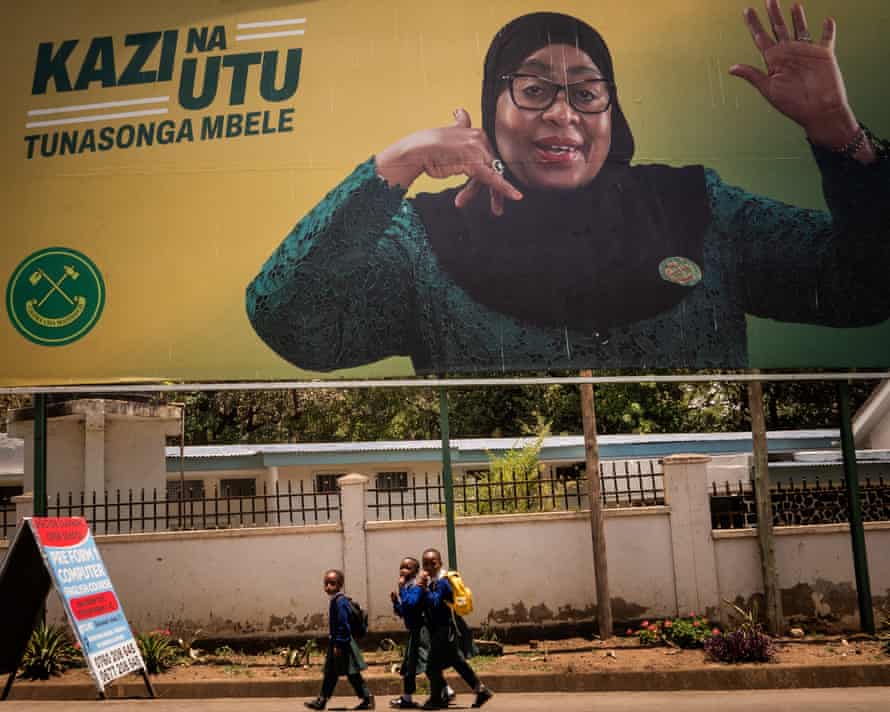Violent demonstrations broke out in Tanzania’s largest city, Dar es Salaam, on Wednesday as the country went to the polls in an election widely seen as consolidating President Samia Suluhu Hassan’s grip on power.
Social media footage showed protesters hurling stones at police and a petrol station ablaze. Internet services were disrupted nationwide, according to the global monitor NetBlocks, which reported a “digital blackout” across the country.
Hassan, who assumed office in 2021 following the death of her predecessor John Magufuli, faces her first electoral test. The contest has been marred by the exclusion of leading opposition figures, allegations of abductions and killings of government critics, and a climate of fear that analysts say is likely to depress turnout.
Opponents from the two main opposition parties, Chadema and ACT‑Wazalendo, have been disqualified from the ballot. Their absence has left Hassan and the ruling Chama Cha Mapinduzi (CCM) party facing only minor challengers.
“Tanzania will never be the same after this election,” said Deus Valentine, head of the Center for Strategic Litigation, a Dar es Salaam‑based non‑profit. “We are either entering a completely new paradigm or level of impunity, or we are entering a completely new level of civil defiance. Something is going to give.”
Hassan began her presidency by reversing some of Magufuli’s most repressive measures, lifting a ban on political rallies and extending an olive branch to opposition leaders. Those early moves won her praise at home and abroad. But in recent years her administration has been accused of returning to authoritarian practices, with critics citing abductions, disappearances and the silencing of dissent.
In June, United Nations experts urged Tanzania to halt the enforced disappearance of political opponents, journalists and human rights defenders, citing more than 200 cases since 2019. The appeal followed the reported abduction and torture of two regional activists, Boniface Mwangi of Kenya and Agather Atuhaire of Uganda.
Among those recently targeted was Humphrey Polepole, a former CCM insider who resigned as ambassador to Cuba and became an outspoken critic of Hassan. His family said he was abducted earlier this month by unidentified individuals. Police have dismissed claims of widespread abductions, suggesting some were staged, while Hassan has previously ordered investigations whose findings have not been made public.
The crackdown on opposition parties has intensified in recent months. In April, Tundu Lissu, Chadema’s vice‑chair, was arrested and charged with treason and cybercrime offences. His party, which had called for a boycott unless electoral reforms were introduced, was later barred from contesting. Last month, ACT‑Wazalendo’s leader, Luhaga Mpina, was also disqualified.
Nicodemus Minde, a researcher at the Institute for Security Studies, described the political environment as “sharply polarised, with opposition leaders facing legal harassment and civic space that has been constrained”. He said the absence of Chadema and ACT‑Wazalendo had made this election “arguably the least competitive” since multiparty politics was reintroduced in 1992.
CCM and its predecessor Tanu have ruled Tanzania since independence in 1961, making it one of Africa’s longest‑standing governing parties. Hassan is campaigning on promises to strengthen healthcare and education, and to expand economic opportunities. “Our goal is to make sure that every Tanzanian has a chance to participate meaningfully in the nation’s economic growth,” she told supporters in Temeke last week.
Her administration points to steady economic growth and low inflation as evidence of progress. But critics argue that the benefits have not been evenly shared, and that political repression has overshadowed economic achievements.
Among the few permitted challengers is Salum Mwalimu of the Chaumma party, a former running mate of Lissu. His campaign has pledged constitutional reform and systemic change. “Tanzanians should expect great change from our party, which is committed to transforming the country,” he said when collecting his nomination papers in August.
Observers note, however, that Hassan’s opponents lack the resources and national reach of CCM, which has spent decades building a formidable political machine. In the 2020 election, Magufuli secured 84.4 per cent of the vote, with Lissu trailing on 13 per cent.
More than 37 million Tanzanians are eligible to vote in the presidential, parliamentary and local elections. With the main opposition excluded, analysts predict a low turnout, sporadic unrest and a further entrenchment of CCM’s dominance.
As ballots were cast under heavy security, the unrest in Dar es Salaam underscored the tension surrounding the poll. Whether the result ushers in greater stability or fuels further defiance remains uncertain, but many believe the country has reached a turning point.



